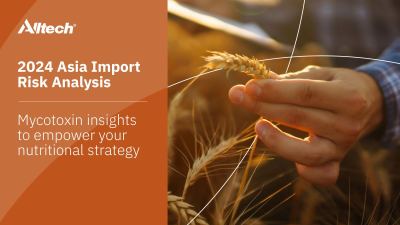Digitizing agriculture, optimizing farming

Our species is experiencing a technological inflection point, according to David Hunt, co-founder of Cainthus.
“Science fiction is becoming science fact,” he said.
In just the last few years, we have landed the rover Curiosity on Mars, discovered the Higgs boson particle and discovered gravitational waves. Hunt, a self-proclaimed science fiction fan, seemed especially impressed by the harpooning of a comet in 2015.
Technological advances on the farm
Hunt has worked for years on some amazing, but slightly more down-to-earth than comet capture, technologies. He and his twin brother co-founded Cainthus, a company dedicated to digitizing agriculture. He described some of the company’s projects in breakout discussions on dairy and the future of farming at ONE: The Alltech Ideas Conference.
Facial recognition for cows
The audience got a glimpse into a few fascinating technologies, some of which are here now and others that are right around the corner. Digital cameras are at the core of many of these advancements. Cainthus has developed facial recognition software for dairy farms that can memorize the face of a cow in six seconds and monitor the activity of an entire herd without wearable tracking devices. They are creating algorithms that will allow their software to alert a farmer when cows show early signs of lameness or when they fight over the best feed. When cows fight, it typically disrupts the entire herd and interrupts them from feeding for up to two hours, which certainly has an impact on milk production.
Scouting fields with drones
Drones are being adopted at a rapid rate on the farm, and Hunt talked about both the potential and the limitations of their use. Self-flying drones are already very successful for monitoring crop growth. Hunt looks forward to a day when farms are photographed twice a day. He warned farmers not to accept any offers from companies offering to fly drones over their farm manually. The cost is prohibitive and would not allow frequent enough flyovers to be beneficial. Current drones are disruptive for use in animal agriculture and will not be fully effective until they are small enough to go unnoticed by animals or can fly high enough that they won’t be seen.
The future of agricultural robotics
Robots will have an enormous impact on agriculture in the next several years. Hunt showed a video of two dog-like robots walking side by side. One was large and clumsy looking, the 2010 model. The other was sleek and graceful and was released just four years later.
“Imagine what they will look like by 2050,” said Hunt.
The significance of robotics for agriculture is huge. Robotic harvesters could allow farming to return to polyculture, the practice of growing multiple crops side by side in the same field. Planting and harvesting with combines has allowed farmers to feed an ever-growing population by ramping up production, but it is dependent on monoculture planting. Polyculture is closer to the natural ecosystem, and proponents say that it results in better soil health and easier pest management.
Digitizing agricultural decisions
Digitizing agriculture will allow farmers to make decisions based on data rather than emotion or hype. Hunt stressed the importance of this, emphasizing the need to base decisions on what is happening on your own farm and not anecdotal evidence from another farm, even the one next door.
“Just because a product works incredibly well on your neighbor’s field doesn’t mean that it will work well on your field,” said Hunt. “If we have precision management observing what things work, what works, what does not work, on a meter-by-meter basis and a plant-by-plant basis, there is no emotion, there is no hype. There’s just good decisions and maximization of productivity.”
In closing, Hunt offered a challenge.
“We have an opportunity today to use the tools that are here to create a utopia by 2050,” said Hunt. “We also have the tools available today to have this planet being a desert by 2050. The choices we make today are going to determine which one we leave behind for our children.”
David Hunt was a presenter at ONE: The Alltech Ideas Conference. Audio recordings of most talks from ONE will be made available on the Alltech Idea Lab by mid-June 2016. For access, click on the button below.
















